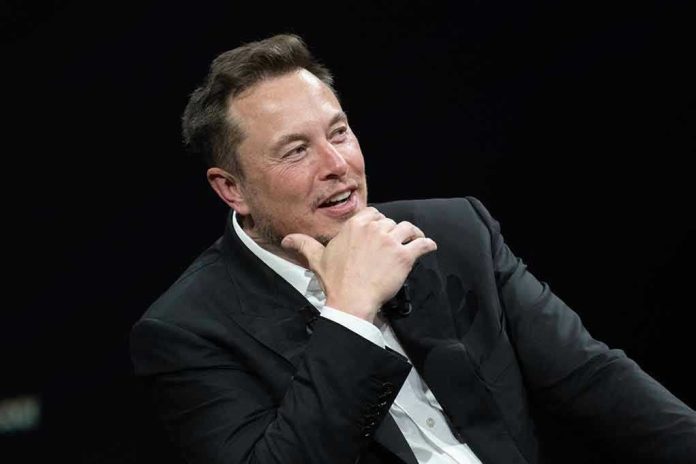
Elon Musk’s latest venture, Macrohard, targets Big Tech’s software dominance with AI—raising serious questions about unchecked power, divided leadership, and the risk of one man’s ambitions steering a critical American industry.
Story Highlights
- Elon Musk unveils Macrohard, an AI-driven software company directly challenging Microsoft’s market stronghold.
- The launch intensifies debate over Musk’s divided attention across Tesla, SpaceX, xAI, and now Macrohard.
- Macrohard aims to simulate entire software ecosystems using generative AI, leveraging xAI’s vast supercomputing resources.
- Industry analysts warn of overextension risks and highlight the broader implications for America’s tech sector.
Musk’s Macrohard: Ambition Meets Overreach in the AI Arms Race
Elon Musk announced the creation of Macrohard, a new AI software company designed to emulate and potentially disrupt technology giants like Microsoft. This move comes as Musk already leads Tesla, SpaceX, xAI, Neuralink, and The Boring Company, stirring concern about whether any individual—regardless of vision—can effectively steer such an unwieldy empire. Macrohard’s stated mission is to simulate entire software companies using advanced generative AI, positioning itself as a “purely AI software company.” The venture is closely tied to xAI’s Colossus supercomputer project, aiming to harness massive computing power for software innovation.
Musk’s strategy with Macrohard is set against a backdrop of intensifying competition in the global AI sector. The AI industry is now defined by a costly race for computing power, talent, and dominance, as companies like Microsoft, OpenAI, Google, and Meta pour billions into infrastructure and research. Musk’s ventures are increasingly interconnected, with AI serving as the backbone of his business empire—blurring lines between automakers, space companies, and software firms. In this environment, Macrohard’s approach not only seeks to undercut established players but also raises the risk of operational distractions and overextension as Musk attempts to integrate AI across all his companies.
Divided Focus: A Threat to Innovation or a Catalyst for Change?
Macrohard’s emergence has reignited longstanding debates about Musk’s leadership bandwidth. Industry experts and investors are asking if Musk can maintain effective oversight as he adds another complex, capital-intensive venture to his portfolio. History shows Musk’s rapid-fire project launches—from Tesla to xAI—often spark operational challenges and concerns about governance. Critics point to past stumbles, warning that spreading resources too thin could jeopardize the health of all his companies. Supporters, however, argue that Musk’s cross-company integration strategy has produced breakthroughs before, and that betting against his ability to drive innovation has repeatedly proven unwise.
Macrohard’s direct targeting of Microsoft signals a new front in the AI-powered software wars. Musk’s public statements describe Macrohard as a “macro challenge,” emphasizing speed and vertical integration as key advantages for xAI and Macrohard over legacy tech giants. The company’s early plans involve leveraging the Colossus 2 supercomputer, expanding operations in Memphis, and acquiring millions of Nvidia GPUs to power AI development at unprecedented scale. At the same time, Tesla shareholders are preparing to vote on potential investments in xAI, while reports suggest SpaceX could commit up to $2 billion—highlighting just how deeply intertwined Musk’s companies have become.
Industry Implications: Opportunity, Risk, and the Future of American Tech
The launch of Macrohard has far-reaching implications for the American technology sector and beyond. In the short term, investors are scrutinizing Musk’s ability to prioritize, fearing that divided attention may undermine operational performance and strategic clarity. Employees across Musk’s businesses face increased pressure as priorities shift and collaboration intensifies between entities. For competitors like Microsoft and OpenAI, Macrohard’s AI-driven approach presents a formidable threat, with the potential to upend traditional software models and force a new wave of innovation—or chaos—across the industry.
Elon Musk is starting yet another AI side project, 'Macrohard,' to challenge Microsoft: Musk’s announcement adds to his list of business ventures that stands to divide his attention even further over his already operational companies https://t.co/RUWnu95Bnh pic.twitter.com/yywhfGlB4N
— Quartz (@qz) August 25, 2025
Macrohard also raises broader questions about concentration of power, the pace of technological change, and the risks of placing so much authority in the hands of one individual. While Musk’s supporters tout his track record and capacity for disruption, critics warn that unchecked ambition and lack of clear oversight could endanger not just his companies, but the stability and direction of entire sectors. As the battle for AI supremacy accelerates, Macrohard’s trajectory will serve as a crucial test of whether America’s free enterprise system can balance bold innovation with responsible stewardship—without sacrificing the principles of competition, transparency, and common sense that conservatives hold dear.
Sources:
Elon Musk targets Bill Gates, Microsoft with new AI venture ‘Macrohard’
Elon Musk’s ‘North Star’ is AI. Now Tesla and SpaceX may invest in xAI.
Elon Musk: A serial entrepreneur’s empire and the companies he’s built
Elon Musk plans to recreate Microsoft with AI, launching Macrohard



